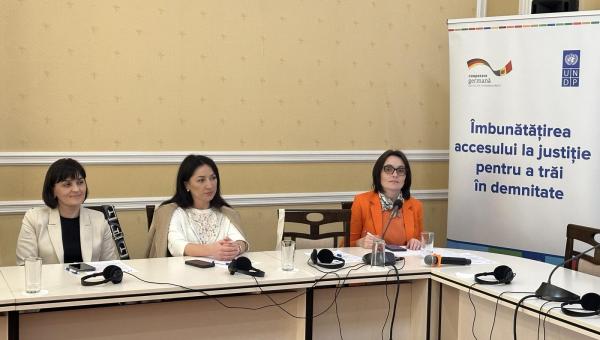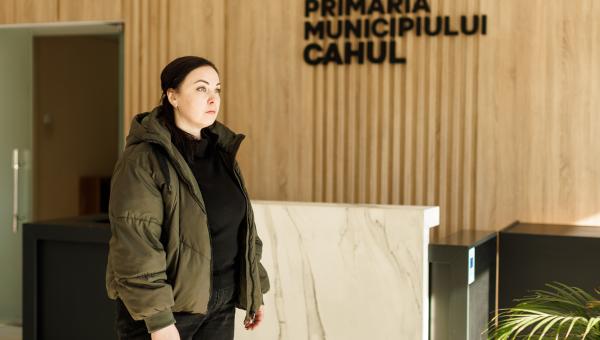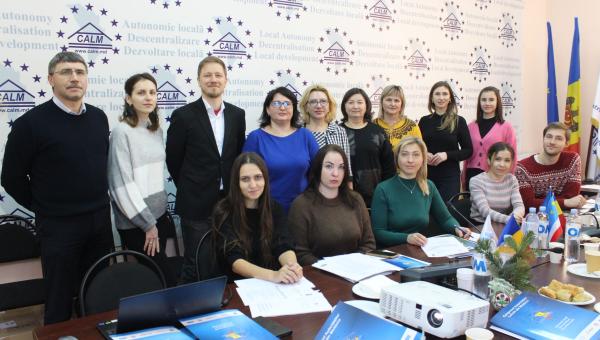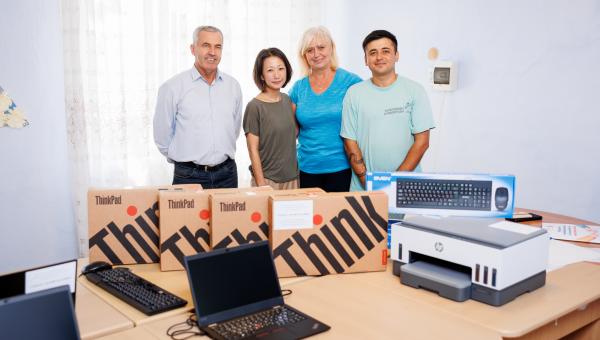
UNDP's response
Supporting refugees from Ukraine and host communities in Moldova
UNDP scales up support in Moldova as early projections suggest thousands could be pushed into poverty by a protracted war.
Since the onset of the war in Ukraine, the people of Moldova and the national and local authorities opened their hearts and their homes to those seeking refuge from the destruction and chaos left behind. UNDP quickly stepped up to support its national and local partners to respond to the refugees influx – improving living conditions and covering essential needs of refugees, promoting access to decent work, providing legal and psychosocial support, and supporting access to a safe and continuous learning environment.
UNDP is working in host communities from both banks of Nistru river to ensure that Ukraine’s refugees receive the support they need.
Key results:
- Over 22,500 refugees from both banks of Nistru river received items for covering basic needs, toys, and gifts for children and benefitted from furniture, household appliances, and IT equipment distributed to refugee shelters.
- Over 2,000 people, including refugees from Ukraine, attended five job fairs organized in Chișinău, Bălți, Cahul, Ungheni, and Căușeni.
- 378 refugees from both banks of Nistru river attended professional development, Romanian language, and digital literacy training, which resulted in enhanced livelihoods and employment opportunities, discovering of new talents and means of psychological relief.
- 5 local companies were supported to expand production, 38 new jobs were created, including for refugees.
- Approx. 1,000 refugees from both banks of Nistru received legal assistance.
- Over 650 refugees from Ukraine received support through the Mobile Teams mechanism covering assistance in legal matters and protection to gender-based violence (GBV) victims, psychological support, support in work integration a as well as capacities building.
- Over 3019 refugees from Ukraine received legal consultations related to temporary protection, residence regime in the Republic of Moldova, access to social services, labor market, medical assistance, education system.
- Through partner NGOs, 810 displaced persons received substantive support and guidance in the context of access to services and legal remedies on their path to solving grievances they face, including in the context of the temporary protection mechanism.
- 698 women and girls benefitted from legal, social, and psychological services provided by the GBV prevention mobile teams in Edinet and Căușeni districts.
- 150 paralegals and social workers were trained in addressing refugees’ needs.
- 42 paralegals have enhanced knowledge and skills to assist and interact with refugees, asylum seekers, and host communities. 16 paralegals completed the induction training and developed skills for interacting with vulnerable people, including refugees, respecting the principles of equality and non-discrimination and contributing to the identification of needs and ways of prompt assistance.
- Rapid assessment of the legal aid system's capacities to respond to refugees' and host communities' needs, as well as on the needs of refugees and asylum seekers in the field of access to legal and other public services, conducted and used to inform the training programme for justice professionals (judges, prosecutors, police officers, paralegals).
- 136 justice professionals trained on the protection of rights of refugees.
- 60 local authorities’ representatives enhanced their knowledge and understanding of the phenomenon of domestic violence, mechanisms for providing assistance and protection to survivors of domestic, as well as approach in providing counselling to refugees.
- Over 2,000 refugees from both banks of Nistru received psychosocial support, including through recreational and education activities for children.
- More than 2,000 refugees from both banks of Nistru received medical care and were helped to cover medicine costs.
- Over 10,000 refugees from both banks received information about the services and assistance available to refugees in Moldova.
- 17 young refugees were able to study STEEAM disciplines using equipment provided to a digital lab on the left bank of the Nistru river.
- 15 communities organized summer camps that brought together 365 refugee children and children from local and diaspora communities.
- 186 young people from all regions of the Republic of Moldova, including from the Găgăuzia region, from the left bank of the Nistru river, as
Approximately US$12.87 million have been allocated by UNDP and its partners – EU, Sweden, France, Germany, UK, Switzerland, Japan – to partially cover the immediate needs of refugees’ and host communities, as well as support socio-economic inclusion of people fleeing the war, by promoting employment opportunities, expanding their access to public services and ensuring social cohesion.
UNDP Economic, Social and Environmental Resilience Offer for Moldova
UNDP aims to enhance the economic, social and environmental resilience of the country, building its support around four pillars:
- Economic and social resilience
- Socio-economic inclusion and social cohesion
- Energy, food security and environmental resilience
- Governance, rule of law and anti-corruption
Energy Vulnerability Reduction Fund
The consequences of the war in Ukraine on the Moldovan population are far-reaching, with particularly adverse effects on already vulnerable and poor segments of the population. Based on a recent simulation exercise, UNDP estimates that the number of people living in poverty due to the impact of the war, including high inflation, could more than triple to about 35% of the total population. UNDP estimated over 63% of families to become energy poor.
The Energy Vulnerability Reduction Fund (EVRF), developed by UNDP and implemented by the Government of Moldova is positively mitigating this trend, supporting energy poor households through short-term compensations and longer-term energy efficiency. Refugees and their host families were encouraged to apply for compensations by registering on the EVRF online platform. Around 792,000 households, including with refugees, have applied for compensations during the period of November 2023-March 2024.
Interagency inclusion & livelihoods working group
UNDP is working closely with the UN entities and other humanitarian stakeholders to meet the specific needs caused by the impact of the war in Ukraine on Moldova. Our work is aligned with the Regional Refugee Response Plan (RRRP), which outlines the comprehensive response and activities needed to support countries’ efforts to protect and assist refugees coming from Ukraine. In addition, UNDP and the Ministry of Labour and Social Protection lead the interagency Livelihoods and inclusion working group, which coordinates and guides partners working in this area and allows for a coherent response.
By focusing efforts on economic and social resilience, UNDP and its partners will be able to both support the Government of Moldova’s current humanitarian needs while at the same time help deliver on the country’s medium to long-term sustainable-development priorities in the spirit of the humanitarian-development-peace Nexus.

 Locations
Locations





